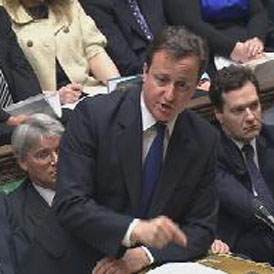The House of Commons reacts to Libya assault
Peter McHugh writes for Channel 4 News on the debate on Libya in the House of Commons, where despite widespread support for action there is still a niggling doubt if, legally, Gaddafi is a target.

Winston Churchill said it was better to jaw-jaw than war-war but on Monday the House of Commons decided to do both.
As peace appeared to break out amongst MPs, war was being waged in the skies over Libya. They had gathered to give the Government formal backing for action against Colonel Gaddafi but it was quickly clear that many were there for an extra reason. Anniversaries are important in military matters and some will have noticed that nine years ago yesterday the invasion of Iraq began and in its train all of the guilt and recriminations that were to follow.
That ghost was clearly in the chamber as MP after MP sought to make the speech and raise the doubts that many might wish they had made then. There were some immediate similarities in that the coalition of the willing, referred to by Prime Minister David Cameron just last Friday, seemed to have become the coalition of the more-than-slightly-confused by Monday.
It had started with Defence Secretary Liam Fox saying Colonel Gaddafi was a legitimate target. The United States then made it clear he wasn’t followed by Foreign Secretary William Hague saying he was.It then got a bit ridiculous when the head of Britain’s armed services said he wasn’t again.
It was against this background that the Prime Minister, praised on all sides for his speed of action over Libya, made the case for the conflict. Standing where Tony Blair had stood just nine years ago he made it clear this was more than different. The UN Security Council had given its formal backing, the Arab League had asked for intervention and the people of Libya were on side.
He was just seven minutes into his defence before the first doubt appeared. How would he avoid “mission creep” asked the SNP’s Angus Robertson. Politicians on all sides now use military phrases as short hand for much more serious questions and what he really wanted to know was how do we avoid the Iraq experience when George W Bush said the war was over in days but thousands were to die in the unplanned years that followed.
The Prime Minister could only say that doing nothing was not an option and what happened next was down to the Libyan people. As for Gaddafi, he had to go but how was yet to be seen.
He said the campaign against Gaddafi was well supported but only Qatar,out of all the arab states were committing troops. Starting a war was easy, said Dennis Skinner, ending it much harder especially if we did not know what would mark the end.
The unease continued to expose itself in a series of interruptions. “What about the £230m of arms we had sold to Libya last year?” asked one MP and “What about Yemen and Bahrain?” said Labour’s Jeremy Corbyn. Would the Prime Minister resign if British “boots” were ever on the ground in Libya?
“People will be rightly concerned we have a clear plan,” he said as most continued to look concerned.
It took Labour leader Ed Miliband to get the debate back on track with the message that this was a great day for multilateralism. He saw in the UN agreement a new dawn as they had for the first time backed action in a just war.He too tried to draw the veil over Iraq saying this action was right in all the ways it had been wrong.
It was former Lib-Dem leader Ming Campbell who came closest to finally laying the Iraq ghost. He told MPs he had voted against the Iraq War because he thought it was illegal then and still thinks it illegal now. Action in Libya was necessary, legal and legitimate and would get his support.
In the world of 24 hour news the war had already moved on even as MPs debated the rights and wrongs of its beginnings, China letting it be known it wanted another chat at the UN. Typhoons loaded with bombs took off for Libya and it was revealed that our planes had turned back from bombing Colonel Gaddafi’s compound last night because there were foreign journalists visiting it.
Back in the Commons Ed Miliband was asked the same question as David Cameron.”Why Libya and not elsewhere? I agree with the Prime Minister an imperfect world order is no excuse for no action”.
But he also summed up all the doubts and fears when he said: “We don’t always know how it ends.”
Peter McHugh is the former director of programmes at GMTV and was last year awarded the Royal Television Society Lifetime Achievement Award.
-
Latest news
-
Mark Menzies: is UK politics full of scandal?33m

-
Windrush scandal: returning to the UK after a forty year wait6m

-
Netanyahu ‘survival’ depends on ‘expanding war’ says head of Palestinian National Initiative5m

-
Proposed law change could strip parental rights from paedophiles5m

-
Hugh Grant settles privacy lawsuit against The Sun newspaper publisher2m

-




